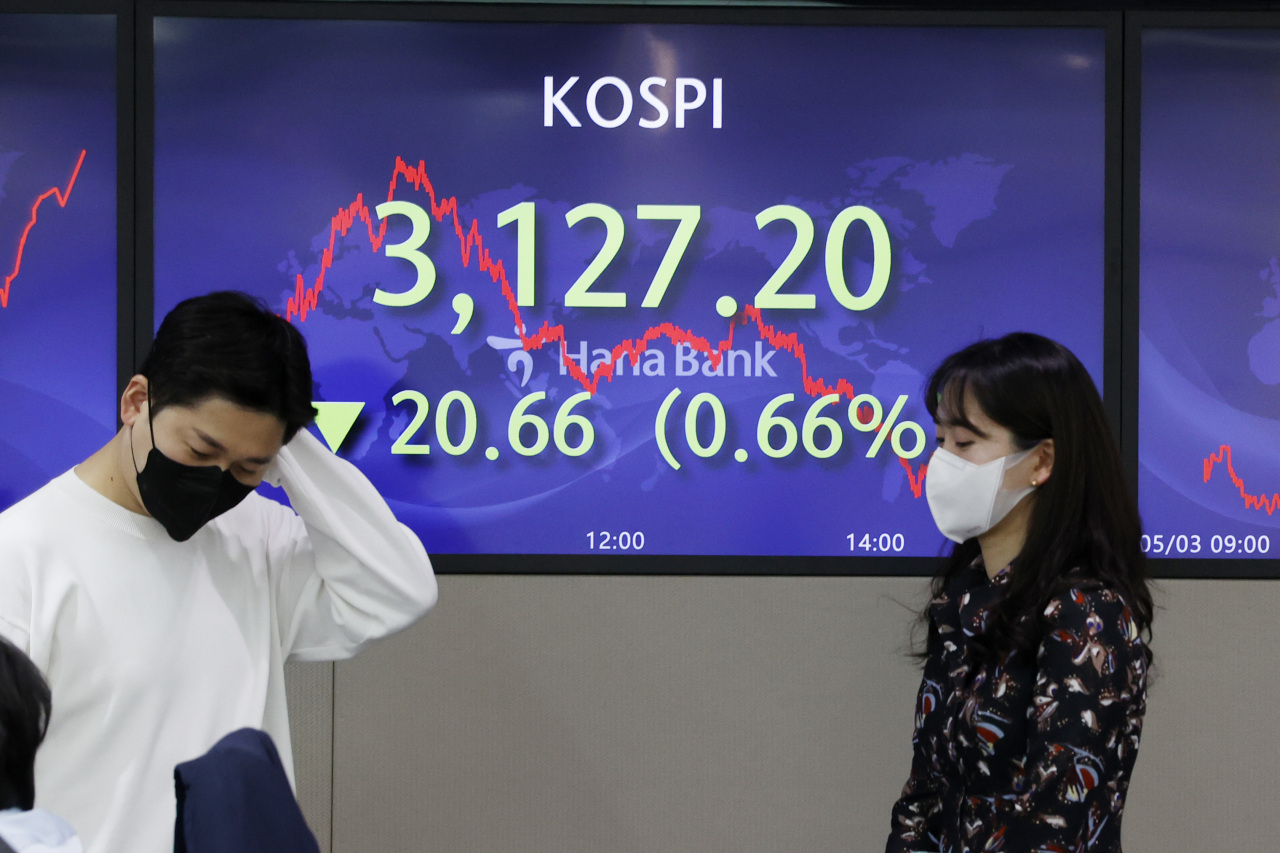 |
An electronic signboard at the trading room of Hana Bank in Seoul shows the benchmark Kospi closed 0.66 percent lower at 3,127.2 points as short selling resumed Monday. (Yonhap) |
South Korea’s stock market retreated for a fifth consecutive session Monday amid strong foreign and institutional selling on the first day the government lifted a 14-month ban on short selling of large-cap stocks. The local currency’s value against the US greenback also weakened.
The main bourse Kospi closed at 3,127.2 points, down 20.66 points or 0.66 percent, from the previous session’s close. The index began trading at 3,149.05 points and once rose up to 3,174.26 points in the morning trade, but erased its earlier gains toward the session’s end.
Foreigners offloaded a net 441.3 billion won ($393.23 million), while institutional investors turned to net sellers during trading and dumped a net 136.5 billion won. Retail investors, however, purchased a net 586 billion won, extending their net buying for a fifth consecutive session.
The tech-heavy Kosdaq ended trading at 961.81 points, shedding 21.64 points or 2.2 percent, from the previous session’s close. It reached as high as 986.20 points in early morning trading but soon continuously moved downward throughout the day.
Foreign and institutional investors extended sell-offs, offloading 167 billion won and 42.4 billion won, respectively. Small domestic investors remained net buyers for a sixth consecutive session, scooping up a net 199.5 billion won.
Beginning Monday, the country eased short selling bans on the Kospi 200 and Kosdaq 150 indexes after it imposed the restriction to protect investors from a sudden market rout triggered by the COVID-19 pandemic.
Short selling is a trading technique in which investors sell stocks they borrowed on the belief that share prices will fall in the near future. They can reap gains by repurchasing the stocks at lower prices later, which is dubbed “short covering.”
While local analysts previously warned investors to be cautious of firms and sectors with high short ratios or high balance of stock lending, some local stocks with such conditions retreated from the first day of resuming short selling activities.
Among Kospi-listed firms, midsized local drug maker Shinpoong Pharm and Doosan Fuel Cell nosedived 12.18 percent and 10.98 percent, respectively. Shares of Hanjin Kal (-8.83 percent), Celltrion (-6.2 percent) and Lotte Tour (-5.15 percent) also crashed.
Some Kosdaq-listed firms tumbled as well. Telecom antennas provider Ace Technologies and Helixmith plummeted 12.53 percent and 10.59 percent. Seegene and KMW stocks collapsed 8.01 percent each, while HLB dipped 4.23 percent.
“Among listed firms with high short selling balance or high ratio in stock lending balance, those with valuation pressure may increase short-term volatility in their stock prices,” said Han Ji-young, an analyst at Kiwoom Securities.
The value of the Korean won weakened 1.05 percent against the US dollar to close at 1,124 won per dollar. It was the first time for the local currency to trade at the 1,120 won-level per dollar since the closing on April 13 at 1,125.9 won per dollar.
By Jie Ye-eun (
yeeun@heraldcorp.com)








